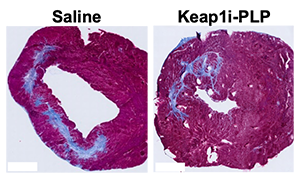
Posted on 04/25/2025 8:33:11 PM PDT by Red Badger
New research shows a polymer injection can help hearts heal after an attack by targeting inflammation at the molecular level.

eart attacks remain a significant health concern in the United States. According to the Centers for Disease Control and Prevention (CDC), approximately 805,000 Americans experience a heart attack each year.
Heart disease, encompassing heart attacks, is the leading cause of death in the U.S., accounting for about 1 in every 5 deaths.
Despite advancements in acute care, many heart attack survivors face a heightened risk of developing heart failure, a chronic condition where the heart cannot pump blood effectively.
Addressing this, researchers from the University of California San Diego and Northwestern University have developed a new intravenous therapy designed to be administered shortly after a heart attack.
This treatment aims to promote healing and significantly reduce the risk of heart failure. In early animal testing, the injectable therapy demonstrated strong results in improving heart function and promoting tissue repair, even weeks after the initial event.
A new approach to repairing damaged hearts
The treatment works by targeting a key molecular process that worsens post-heart attack inflammation.
Under normal stress conditions, the body activates a protective protein called Nrf2, which helps cells resist inflammation-induced damage.
However, a second protein, KEAP1, binds to Nrf2 and breaks it down, weakening this protective effect.
The injectable therapy uses a protein-like polymer, or PLP, that mimics Nrf2. Once in the bloodstream, the polymer seeks out KEAP1 and binds to it, stopping it from degrading Nrf2.
This protects the heart muscle and helps the tissue heal more effectively.

Side-by-side images show heart tissue damage (in blue). Saline-treated cells (left) show more damage than those treated with the PLP platform (right). Image Courtesy: UC San Diego
*********************************************************************
Significant healing observed in animal trials
To test the therapy’s impact, researchers conducted a blinded study on rats that had experienced heart attacks.
One group received the PLP treatment via intravenous injection, while a control group received a saline solution. Five weeks later, all animals underwent MRI scans under sedation.
The results were significant. Rats treated with the polymer showed significantly improved cardiac function and more extensive healing in their heart tissue compared to the control group. Additional tests confirmed the upregulation of genes linked to tissue repair.
The researchers describe the work as a proof of concept and plan to refine the design and dosage before progressing to tests in larger animals.
Broader potential
While developed to address cardiac damage, the therapeutic approach could extend to other major diseases.
Co-author Nathan Gianneschi, a professor of chemistry at Northwestern, sees potential applications in conditions ranging from macular degeneration to kidney disease.
“This therapeutic platform has tremendous potential for several diseases, including everything from macular degeneration to multiple sclerosis and kidney disease,” Gianneschi said.
Tackling disease at the molecular level
The therapy also offers a new strategy for overcoming one of the toughest obstacles in drug development: disrupting disease-related protein interactions inside cells.
“Proteins are the molecular machines that drive all essential cellular function, and dysregulated intracellular protein-protein interactions are the cause of many human diseases,” Gianneschi said.
“Existing drug modalities are either unable to penetrate cells or cannot effectively engage these large disease target domains. We are looking at these challenges through a new lens.”
PING!..................
Great stuff!
Is this a cure for the jab?
Heart attacks...............
There are many drugs which work great in dogs or rats or pigs....but don’t do much in humans. I hate it when news reporters give such a glowing review of a drug tested in rats and extrapolate the results to every human on the planet.

Disclaimer: Opinions posted on Free Republic are those of the individual posters and do not necessarily represent the opinion of Free Republic or its management. All materials posted herein are protected by copyright law and the exemption for fair use of copyrighted works.